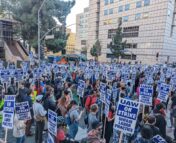This post was written by Pratik Gandhi and Isabella Trierweiler. The views presented here are not necessarily representative of the views of the American Astronomical Society or other institutions with whom our authors are affiliated.
Authors’ note: be sure to check out our previous bites covering the strike, including the original post, first week updates, and third week updates.
Tentative Agreement reached, but it’s not over yet
A tentative agreement has been reached between the UC and union bargaining teams. The agreement comes a few days after the union agreed to enter a mediation process with the UC, and the voting process to ratify the agreement starts this Monday.
Union members are divided on whether to vote yes or no to the ratification; you can check out these links for statements from the bargaining team that are for and against ratifying. Below, we’ll outline the mediation process that resulted in this tentative agreement and the pros and cons that graduate student workers are considering when deciding whether to ratify the offer into a contract.
How we got here
On December 12, both graduate student bargaining units (UAW 2865 for teaching assistants and SRU-UAW for student researchers) entered into a process called “voluntary mediation” after it was requested by the UC. This meant that both bargaining teams agreed to bring in a third party mediator to help move the bargaining process forwards. Mediation can sometimes be an effective way to close gaps between the various bargaining team proposals as it offers a chance to speak more freely off the record. The chosen mediator was Darrell Steinberg, the mayor of Sacramento, proposed by California Governor Gavin Newsom (a member of the UC board of regents).
Strikers initially thought the mediation process would last several weeks, however a verbal proposal was offered by the UC within a week, and the union bargaining teams voted to accept it as a tentative agreement on the evening of Friday, December 16th. This week union members will vote on whether to ratify the tentative agreement into a new contract and end the strike.
Polarizing tentative agreement
Although the tentative agreement is being touted by many as “historic”, there remain a number of student workers who are unhappy with the relative lack of progress it represents. The increase in wages is substantial, as the base pay for a graduate student researcher would increase from ~$22,000 to ~$32,000 per year. However it is still far below the $54,000 mark that workers were hoping for at the beginning of the strike, and the full pay increase will only arrive in October 2024. Most importantly, despite the wage increases, the proposal will still leave UC graduate students with an effective pay cut and even more rent burdened than they were in 2018, as this cross-campus analysis shows. The tentative agreement also provides different pay levels for different UC campuses, with lower pay at some of the campuses with the highest costs of living (Santa Cruz and Santa Barbara), and union members are still trying to understand whether pay practices of individual departments can be counted on to offset this difference.
The aspect of the proposal that all strikers agree is positive is added safety measures for researchers; students could now file grievances with the union if they experience bullying or harassment in the lab, and can receive workers’ compensation for injuries. However, there are far more protections that many students argue are critical for upholding basic personhood and reasonable working conditions – including articles for removing cops from campuses, fee remissions that would relieve international students from paying an extra $15,000 in tuition per year, disability access accommodations, and expanded coverage for childcare and dependent healthcare. These issues affect the most marginalized workers in the UC, leading to concerns that the union may be leaving its most vulnerable members behind.
Further issues include the rushed nature of the mediation process, which students were originally told would include plenty of time for discussion before union-wide ratification voting commenced. Instead, the bargaining team representing the union voted to accept tentative agreement only minutes after a campus-wide town hall, and the scheduled vote this week overlaps with winter break and Hanukkah. Given how important international student fee remissions are to the contract discussion, it is also inconvenient timing as most international students are currently in their home countries, making organizing town halls and discussions across multiple time zones all the more difficult.
Informal straw polls in departments across the UC generally show strong support for the proposed contract in many STEM departments, but much more hesitation in the humanities, arts, and social sciences.
Based on comments from a UC-wide town hall on Saturday, members in favor of voting yes argued that striking power is diminishing, and turning down the contract risks losing the gains in wages and moving into a stage of bargaining where the UC would have the upper hand. They suggest that this contract is a solid step forward for now, and the union should vote yes and focus on preparing for bargaining again when the contract is over in 2.5 years.
Students who are against ratifying the proposal and continuing the strike point out that the contract is okay for the most privileged students who come from generational wealth or are employed by departments that already provide higher wages, but does nothing to protect marginalized students such as people of color, students with access needs, international students, and parents with dependents. They argue that extended, long-haul strikes following a successful No vote on a proposed contract have worked out in the past (see a letter from Columbia students discussing a similar case here), and that much more remains to be won at the bargaining table. Importantly, they note that a successful No vote would not risk losing everything gained so far, since the UC would be legally obligated to bargain in good faith if bargaining were to resume, and maintain at the very least the contract articles that have already been proposed.
The path forward
From Monday, December 19th to Friday, December 23rd, all graduate student union members at the ten UC campuses will have the chance to vote on whether to ratify the tentative agreement into a new contract. A greater-than-50% majority voting Yes would result in a new contract for the next 2.5 years, and the official end of the strike. However, if the majority vote No, bargaining between the union and the UC would likely resume and the strike would continue. There is currently a significant amount of organizing amongst the graduate students for both Yes and No votes, and at this point it is too early to get a sense of which will prevail. After December 23rd we will have a much better idea of exactly how much UC graduate students have won, and how much they are willing to continue fighting for.
Edited by Jessie Thwaites
Featured image credit: UAW 2865




